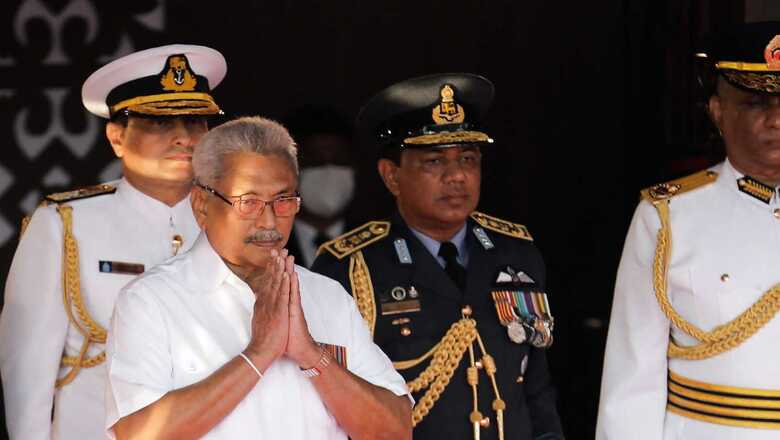
views
The Rajapaksa family rulers have faced a disgraceful exit from power. Former Sri Lanka Prime Minister Mahinda Rajapaksa and former Finance Minister Basil Rajapaksa had already resigned amidst angry protests in the island country. Now, former Sri Lanka President Gotabaya Rajapaksa too has resigned. His resignation, however, seems more like an involuntary move. Once angry protesters stormed the Presidential Palace and demanded Gotabaya’s prompt resignation, he wasn’t really left with a choice but to throw in the towel.
However, what has stood out in Gotabaya Rajapaksa’s fall from grace is China’s shocking nonchalance. Make no mistake, Gotabaya has cultivated close relations with China over the past two-and-a-half years. Yet, China seems to be giving him a cold shoulder at a time when the former Sri Lanka President desperately needs some support. This is a lesson for pro-China leaders around the world about how playing into Beijing’s hands can backfire badly for them.
Gotabaya struggling to find asylum and support
Gotabaya Rajapaksa is possibly one of the most troubled politicians across the world right now. He and his clan have been thrown out of power due to angry public protests and now he is also struggling to avoid facing prosecution back home.
This is why Gotabaya flew to the Maldives when he was still the President. Since the President in Sri Lanka enjoys immunity from prosecution, Rajapaksa decided to move to the Maldives with his wife in a military aircraft and announced his resignation only after leaving Sri Lanka.
An official statement by Sri Lanka Air Force (SLAF) read, “In accordance with the powers vested in an Executive President in the Constitution of Sri Lanka, at the request of the existing Government, subject to the full approval of the Ministry of Defence, and subject to immigration, customs and all other laws at the Katunayake International Airport, the President along with the First Lady and two security guards departed on an Air Force flight to Maldives early this morning.”
However, the Maldives made it clear that it would only serve as a transit location for Gotabaya and he would ultimately move to some other location. Meanwhile, the US has refused a visa to the former Sri Lanka President and India too has denied facilitating his travel.
Gotabaya was allowed to enter Singapore on Thursday, but the city-State has denied asylum to the former Sri Lanka President. News agency AFP quoted Singapore’s Foreign Ministry as saying, “It is confirmed that Mr Rajapaksa has been allowed entry into Singapore on a private visit.”
China snubs Gotabaya
Yet, this is not a matter of surprise. After all, India, the US, the Maldives or Singapore were not the ones expected to shield Gotabaya in the first place. But what about China, the country to whom the Rajapaksa family gifted several strategic projects without even scrutinising how such actions would backfire for the island country?
China has been making generic remarks about the ongoing political and economic crisis in Sri Lanka and is simply showing no signs of backing Gotabaya Rajapaksa. When asked about public protests forcing the former Sri Lanka President to flee out of the country, Chinese Foreign Ministry spokesman Wang Wenbin said, “As a friend, neighbour, and cooperation partner, China sincerely hopes that all sectors in Sri Lanka could bear in mind the fundamental interests of their country and people and work together in solidarity to overcome the current difficulties and strive to restore stability, revitalise the economy and improve people’s livelihoods at an early date.”
The Chinese had given a similar reaction when Gotabaya’s elder brother and former Prime Minister Mahinda Rajapaksa had resigned due to public protests. And China has not only avoided offering asylum or publicly supporting the Rajapaksa brothers, but has also shown a disinclination to bail out the Sri Lankan economy. While the Rajapaksa regime was trying to somehow control soaring fuel and food prices in order to soothe the rising public anger, China had blocked Colombo from accessing an existing $1.5 billion credit line. In fact, Gotabaya had himself acknowledged that China was uninterested in helping the island economy.
Hazards of Chinese ‘friendship’
The entire episode comes as a stark reminder about dangers of associating too closely with Beijing. China itself was a major beneficiary of dynasty politics and corruption linked to the Rajapaksa clan. Even before the Belt and Road Initiative (BRI) came into picture, China had invested in projects like the Mattala Rajapaksa International Airport in southern Sri Lanka that was built with a high-interest loan and has been facing operational losses since its very inception.
During the 2015 polls, Chinese State-owned corporations contributed millions of Dollars towards Mahinda Rajapaksa’s campaigning and gave away gifts worth hundreds of thousands of Dollars to the supporters of the Rajapaksa clan. In return, China was given the leeway to invest in ill-conceived projects built at high interest loans like the Hambantota port project. When Colombo failed to repay for such a loss-making project, Beijing also ended up taking over the port on a 99-year lease.
Even when the world was talking about the Hambantota port fiasco, Gotabaya showed willingness to allow Beijing to invest in the Colombo Port City project which has turned out to be yet another white elephant for the Sri Lankan economy.
The Chinese government thus reaped extensive strategic gains through close ties with the Rajapaksa clan. However, China has now realised that the Rajapaksa family has fallen out of favour in Sri Lanka. There was a time when Beijing used to specifically invest in the Rajapaksa family but now the Chinese are trying to de-hyphenate from it.
This is a lesson for Gotabaya and all other world leaders who tend to bank on Chinese investments. This isn’t just about the fact that Chinese investments can leave your country debt-trapped, but also about Beijing’s tendencies to first cultivate personal relationships with an individual or a family and abandoning them when things go downhill. Gotabaya Rajapaksa has already faced this, but who knows if Shahbaz Sharif may also be abandoned by China when things go downhill in Pakistan.
Similarly, pro-China leaders in Southeast Asia and Africa must understand that developing a personal relationship with Beijing can backfire badly because the Chinese believe in positioning themselves appropriately to deal with the regime in power instead of looking after their so-called friends. China’s snub to Gotabaya is thus an important lesson for all pro-China leaders across the world.
Read all the Latest News, Breaking News, watch Top Videos and Live TV here.
















Comments
0 comment